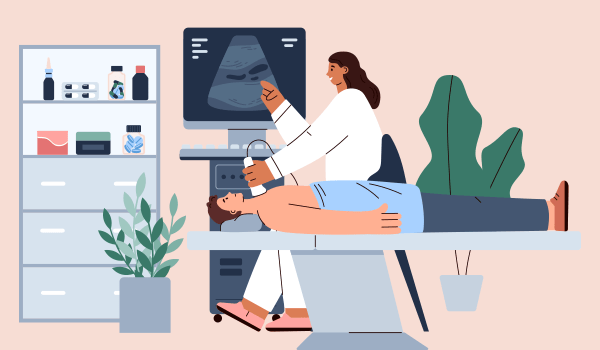Hyperthyroidism is the condition where an overactive thyroid produces too much thyroid hormone and speeds up your metabolism. A typical hypothyroid patient suffers from sleepiness, cold intolerance, dry skin, weight gain, loss of appetite, constipation, and a low pulse, while a typical hyperthyroid patient endures sleepless nights, heat intolerance, excessive sweating, weight loss, a voracious appetite, loose bowels, and a high pulse.
Hyperthyroidism is considerably less common than hypothyroidism, but they are both more prevalent in women than men. The risk for hyperthyroidism increases with age, with one exception. Graves’ disease, the most common cause of hyperthyroidism, tends to strike women in their reproductive years, from between the ages of twenty and fifty. Both hypothyroidism and hyperthyroidism cause fewer detectable symptoms in older people. As these diseases present themselves in subtle ways in this age group, they may seem like another disease altogether, masquerading as heart disease, psychiatric problems, or bowel problems. Hyperthyroidism can be dangerous if not treated properly. It puts you at risk for osteoporosis, and, as too much thyroid hormone makes your heart work faster and harder, it can lead to heart difficulties. Most people who experience a variety of classic symptoms are treated with drugs that suppress the production of thyroid hormone, with radioactive iodine that destroys part of the thyroid gland, or with surgery before life-threatening complications or permanent heart damage occurs. In older patients, however, a heart problem is often the first sign of hyperthyroidism.

Recognizing Signs and Symptoms
The following are the most common signs and symptoms experienced by people with hyperthyroidism.
- Enlarged thyroid gland: As your thyroid produces more and more hormones, your thyroid enlarges and can protrude from your neck to form a goitre. If the goitre is noticeable enough, it may feel lumpy.
- Heat intolerance: A speeded-up metabolism leads to an increase in your body temperature. You may be the only one in the room who wants to open a window, or you may find yourself in short sleeves while others are wearing sweaters.
- Exhaustion: Your body is perpetually in overdrive, which essentially tires out every one of its systems. You may find yourself out of breath after crossing the street or climbing the stairs.
- Emotional changes: Your body’s exhausted state coupled with an overstimulated central nervous system can lead to a variety of emotional changes, such as anxiety intermixed with depression, insomnia, and irritability.
- Perspiration and thirst: As your body temperature rises, your sweat glands tend to overproduce, and you must continually replenish fluids.
- Constant hunger: As your body uses up energy, it tends to cry out for more, which can lead to an insatiable appetite.
- Unexplained weight loss: Even though you may find yourself constantly eating, you could lose weight, usually between five and ten pounds. If you have severe thyrotoxicosis, you can experience extreme weight loss.
- Racing heart: Hyperthyroidism causes abnormal heart rhythms. Out of nowhere, you may suddenly feel your heart race. This may occur while being physically active or even at rest.
- Fast pulse: If you habitually take your own pulse as part of your exercise regimen, you will notice a more rapid pulse than normal. If, for example, your normal pulse is between the 60 to 70 beats per minute range, you may find your heart is beating 80 to 100 times a minute.
- Hand tremors: You may notice your hands shaking. It might be subtle, or it could be to the point where you can’t carry a drink across the room without spilling it. This is the result of overstimulated nerves.
- Muscle weakness: Excess of thyroid hormone breaks down muscles. You are likely to experience a feeling of weakness, particularly in your arms and legs. If you are a physically active person, you may notice marked changes in your athletic performance.
- Diarrhoea: An overactive thyroid causes your digestive system to speed up, and this leads to frequent, loose bowel movements.
- Eye problems: Particularly if you have Graves’ disease, you may experience eye problems, and they can be quite severe. The most common eye symptom is a retraction of the eyelids that makes your eyes appear to bulge or stare dramatically. Eyes may become puffy and watery with double vision.
- Menstrual changes and infertility in women: If you are a woman of childbearing age, your periods may be lighter, or you may skip periods. This may cause changes in the ovulation cycle and even lead to infertility.
- Infertility decreased libido, and enlarged breasts in men: If you are a man, hyperthyroidism also interferes with your sperm cycle, causing temporary infertility. Decreased libido may stem from the weakening effect of hyperthyroidism, along with a relative decline in testosterone. Enlarged breasts (known as gynecomastia) result from a relatively high level of oestrogen.
- Hives: Itchy rash may be noticed that requires treatment.
Signs and Symptoms of Hyperthyroidism in Elderly People
If you are over sixty years old, a diagnosis of hyperthyroidism may be delayed because you tend not to experience the number of symptoms that younger people do. While you may experience classic symptoms of hyperthyroidism, it is more typical that you would show a few or only one of the following symptoms.
- Depression: As an older person with hyperthyroidism, you are more likely than a younger person with the disease to develop depression that may appear as apathy. Though depression is sometimes cited as a feature of hyperthyroidism in younger people, it is usually intermixed with anxiety in younger people. On the other hand, as an older person with hyperthyroidism, you would tend to experience depression alone. If you exhibit this symptom, you will often feel sad and lethargic and have little interest in either yourself or your surroundings.
- Congestive heart failure: Your most prominent sign of hyperthyroidism could be congestive heart failure, the symptoms of which include breathlessness, swelling in your ankles, weakness, and fatigue. In the case of an overactive thyroid, backup in blood flow and ineffective pumping result from the heavy burden hyperthyroidism places on your heart.
- Fast pulse: Studies reveal that an abnormally short pulse, known as tachycardia, of over 100 beats per minute occurs in 50 per cent of older patients. It occurs in 90 per cent of younger patients. This sign may only be noticed if you have seen a doctor.
- Atrial fibrillation (racing and irregular heartbeat): Studies reveal that 35 per cent of older patients experienced disorganized heart rhythms characterized by atrial fibrillation while only 2 per cent of younger patients did.
- Nervousness and exhaustion: You may be one of the approximately 20 per cents of older people who feel the nervousness and anxiety typically experienced by younger patients with an overactive thyroid. Contrary to this, one might even feel lethargic.
- Excessive weight loss: A younger person with hyperthyroidism may experience some weight loss, but you may tend to lose even more weight, to the point where you could appear malnourished.
- Muscle weakness: If you have lost a lot of weight, you are likely to have profound muscle weakness due to an accelerated breakdown of your muscles.
What to do?
It is advised to visit your physician and get tested at the earliest in case you observe any of the above symptoms. This helps in getting proper treatment and related advice so that health can be restored as soon as possible.






























Share this article